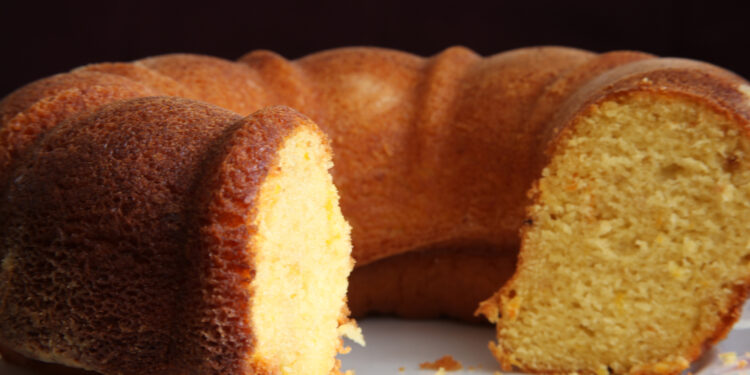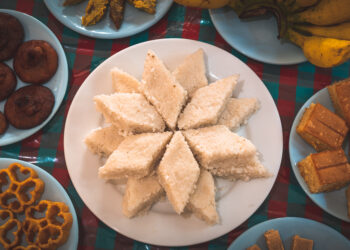When you think of Caribbean desserts, what comes to mind? Is it the rich, moist rum cake enjoyed at celebrations or the chewy coconut drops that sweeten your afternoon tea? The Caribbean is a haven for those with a sweet tooth, offering a variety of treats as diverse as its cultural tapestry. Each dessert tells a story, reflecting the vibrant blend of African, Indian, and European influences that have shaped the region’s culinary landscape. Intrigued? Let’s dive deeper into this sugary paradise and discover what makes these desserts so irresistible.
Understanding Caribbean Desserts: A Sweet Journey
Caribbean desserts are a delightful blend of flavours, textures, and aromas that reflect the rich tapestry of cultures across the Caribbean islands. Bursting with tropical fruits, spices, and often a generous splash of rum, these sweets offer a taste of paradise. Imagine the warmth of a freshly baked rum cake or the chewy, coconut-infused bites of coconut drops—each dessert tells a story of the region’s vibrant history. From the dense, sweet goodness of cassava pone to the tangy, sugar-coated tamarind balls, these treats are more than just food; they’re a celebration of the Caribbean way of life. Whether enjoyed during a festive carnival or a family gathering by the sea, Caribbean desserts are a testament to the islands’ diverse cultural influences and deep-rooted traditions.
A Rich History of Caribbean Desserts
The history of Caribbean desserts is as colourful and multifaceted as the islands themselves. This culinary journey begins with the indigenous Taino people, who utilised local ingredients like cassava and tropical fruits. The arrival of African slaves introduced new cooking techniques and ingredients, infusing richness and texture into traditional recipes. Later, European colonists added their influence, bringing sugar to the forefront of Caribbean cuisine. Indian indentured labourers contributed spices like cinnamon, nutmeg, and cardamom, enriching the depth of flavours. Over centuries, these diverse influences interwove to create unique sweets. Today, Caribbean desserts reflect a melting pot of histories and flavours, each bite telling a story of cultural adaptation and resilience.
Recipe Spotlight: Classic Caribbean Rum Cake
No discussion of Caribbean desserts is complete without the iconic rum cake. This beloved treat graces every celebration, from weddings to Christmas feasts, and its rich, moist texture and bold flavours make it unforgettable.
Ingredients:
For the Cake:
- 2 cups all-purpose flour
- 1 1/2 teaspoons baking powder
- 1/2 teaspoon baking soda
- 1/2 teaspoon salt
- 1 cup unsalted butter, softened
- 1 3/4 cups granulated sugar
- 4 large eggs
- 1/2 cup milk
- 1/2 cup dark rum (preferably Jamaican rum)
- 1 teaspoon vanilla extract
- 1/2 teaspoon almond extract
For the Rum Syrup:
- 1/2 cup unsalted butter
- 1/4 cup water
- 1 cup granulated sugar
- 1/2 cup dark rum
Instructions:
- Preheat the Oven: Preheat your oven to 175°C (350°F). Grease and flour a bundt pan or a 9-inch round baking pan.
- Mix the Dry Ingredients: In a medium bowl, sift together the flour, baking powder, baking soda, and salt. Set aside.
- Cream Butter and Sugar: In a large mixing bowl, cream the butter and sugar until light and fluffy, about 3-4 minutes.
- Add Eggs and Extracts: Add the eggs one at a time, mixing well after each addition. Stir in the vanilla and almond extracts.
- Incorporate Dry Ingredients: Gradually add the dry ingredients to the wet mixture, alternating with the milk and rum. Mix until just combined.
- Bake: Pour the batter into the prepared pan and smooth the top. Bake for 45-50 minutes or until a toothpick inserted into the centre comes out clean.
- Prepare the Rum Syrup: While the cake is baking, make the syrup. In a saucepan, combine the butter, water, and sugar. Bring to a boil, stirring until the sugar dissolves. Remove from heat and stir in the rum.
- Cool and Soak: Once the cake is done, let it cool for 10 minutes in the pan. Poke holes all over the cake with a skewer or fork. Slowly pour the rum syrup over the cake, allowing it to soak in.
- Invert and Serve: Invert the cake onto a serving plate and let it cool completely. Serve slices on their own or with whipped cream for an extra indulgent touch.
Why Indulging in Caribbean Desserts Is a Sweet Choice
- Cultural Richness: Caribbean desserts embody a rich cultural identity, blending African, Indian, and European influences. Each bite tells a story of history and heritage.
- Vibrant Flavours: With tropical fruits like mango, pineapple, and coconut and spices like cinnamon and nutmeg, these desserts are a flavour explosion.
- Health Benefits: Many desserts feature nutrient-rich ingredients like cassava and coconut, making them indulgent yet wholesome.
- Inclusivity: Recipes can be adapted to suit vegan or gluten-free diets, ensuring everyone can enjoy these delicious treats.
- Connection: Sharing Caribbean desserts is often a communal experience, strengthening bonds and celebrating life’s simple pleasures.
Tips for Mastering Caribbean Desserts at Home
- Invest in quality ingredients like fresh coconut and dark rum for authenticity.
- Don’t shy away from spices; they’re the essence of Caribbean flavours.
- Experiment with substitutions, such as using sweet potato instead of cassava.
- Garnish desserts with tropical fruits or edible flowers for a vibrant presentation.
- Always use fresh produce to enhance the natural flavours.
Discovering Caribbean Desserts in the UK
For those craving authentic Caribbean desserts, there are several fantastic spots in the UK to explore:
- Brixton Market, London: A hub for Caribbean stalls offering treats like tamarind balls and coconut drops.
- Manchester’s Moss Side: Known for bakeries selling rich rum cakes and cassava pone.
- Birmingham’s Caribbean Food Festival: A celebration of Caribbean culture featuring dessert stalls that delight the senses.
Conclusion
Caribbean desserts are more than just sweet treats—they’re a celebration of culture, history, and flavour. Whether you’re indulging in a slice of rum cake or experimenting with your own take on cassava pone, these desserts bring the spirit of the Caribbean to life. Ready to try your hand at some tropical baking? For more culinary adventures and recipes, visit Currybien. Dive in, get creative, and let the sweetness of the Caribbean inspire your kitchen!

















